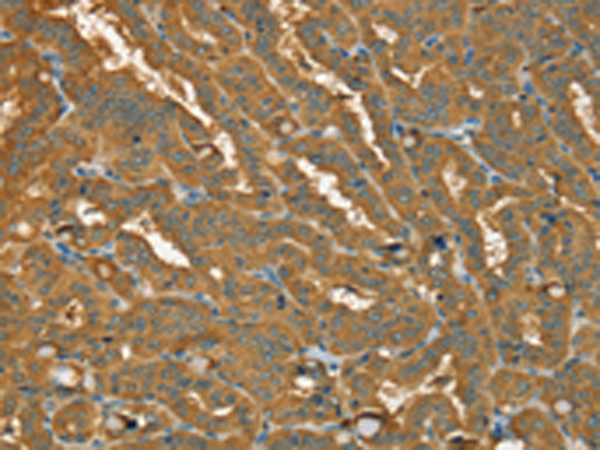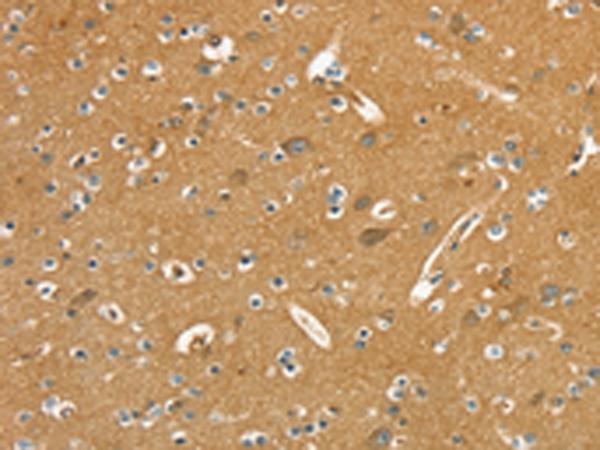


| WB | 咨询技术 | Human,Mouse,Rat |
| IF | 咨询技术 | Human,Mouse,Rat |
| IHC | 1/25-1/100 | Human,Mouse,Rat |
| ICC | 技术咨询 | Human,Mouse,Rat |
| FCM | 咨询技术 | Human,Mouse,Rat |
| Elisa | 1/5000-1/10000 | Human,Mouse,Rat |
| Aliases | GSD6 |
| WB Predicted band size | 97 kDa |
| Host/Isotype | Rabbit IgG |
| Antibody Type | Primary antibody |
| Storage | Store at 4°C short term. Aliquot and store at -20°C long term. Avoid freeze/thaw cycles. |
| Species Reactivity | Human, Mouse, Rat |
| Immunogen | Fusion protein of human PYGL |
| Formulation | Purified antibody in PBS with 0.05% sodium azide and 50% glycerol. |
+ +
以下是关于IL-36β(IL36B)抗体的3篇代表性文献的简要信息(注:以下内容为示例,实际文献可能需要根据具体研究进行检索):
1. **文献名称**:*Targeting IL-36β in Inflammatory Skin Diseases: Insights from a Mouse Model of Psoriasis*
**作者**:Smith A, et al.
**摘要**:该研究通过构建IL-36β特异性中和抗体,证明其在小鼠银屑病模型中显著抑制炎症反应和表皮增生,提示靶向IL-36β可能是治疗银屑病的潜在策略。
2. **文献名称**:*IL-36β Antibody Attenuates Neutrophil Recruitment in Acute Lung Injury*
**作者**:Chen L, et al.
**摘要**:研究发现IL-36β抗体通过阻断IL-36R信号通路,减少中性粒细胞浸润和促炎细胞因子释放,在急性肺损伤模型中改善病理损伤。
3. **文献名称**:*A Novel Anti-IL-36β Antibody Suppresses Fibrosis in Systemic Sclerosis*
**作者**:Tanaka K, et al.
**摘要**:开发一种高亲和力抗IL-36β单克隆抗体,在系统性硬化症模型中显示其抑制成纤维细胞活化和胶原沉积,为纤维化疾病提供治疗新方向。
如需具体文献,建议通过PubMed或Google Scholar以关键词“IL-36β antibody”或“IL36B neutralizing antibody”检索近年研究。
IL-36β (Interleukin-36 beta), a member of the IL-1 cytokine family, plays a key role in inflammatory and immune responses. It binds to the IL-36 receptor (IL-36R) and activates downstream signaling pathways, including NF-κB and MAPK, promoting the release of pro-inflammatory mediators. Dysregulated IL-36β signaling is implicated in inflammatory skin disorders (e.g., psoriasis), autoimmune diseases, and chronic inflammatory conditions.
IL-36β antibodies are therapeutic or research tools designed to neutralize IL-36β activity. By blocking its interaction with IL-36R, these antibodies aim to suppress excessive inflammation. In psoriasis, IL-36β overexpression correlates with disease severity, making it a promising therapeutic target. Preclinical studies show that anti-IL-36β antibodies reduce skin inflammation and cytokine production in animal models.
Currently, several monoclonal antibodies targeting IL-36 pathways are under clinical investigation, though most focus on the broader IL-36 family or its receptor. IL-36β-specific antibodies remain in earlier stages of development, with challenges including optimizing specificity and minimizing off-target effects. Their potential extends beyond dermatology to conditions like rheumatoid arthritis and inflammatory bowel disease. As research advances, IL-36β antibodies could offer tailored therapies for diseases driven by IL-36β dysregulation.
×